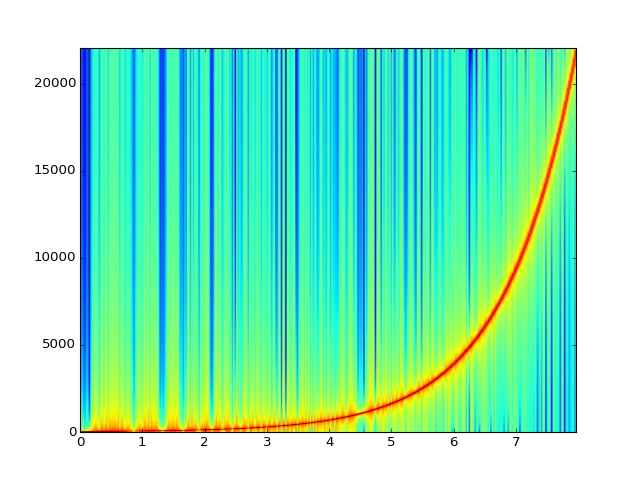Timeside Core Analyzers¶
Global analyzers¶
Mean DC Shift¶
-
class
timeside.plugins.analyzer.dc.MeanDCShift[source]¶ Bases:
timeside.core.analyzer.AnalyzerMean DC shift analyzer
-
static
id()[source]¶ Short alphanumeric, lower-case string which uniquely identify this processor, suitable for use as an HTTP/GET argument value, in filenames, etc…
-
static
name()[source]¶ Return the analyzer name, such as “Mean Level”, “Max level”, “Total length, etc..
-
setup(channels=None, samplerate=None, blocksize=None, totalframes=None)[source]¶ Allocate internal resources and reset state, so that this processor is ready for a new run.
The channels, samplerate and/or blocksize and/or totalframes arguments may be required by processors which accept input. An error will occur if any of these arguments is passed to an output-only processor such as a decoder.
-
static
Level¶
-
class
timeside.plugins.analyzer.level.Level[source]¶ Bases:
timeside.core.analyzer.AnalyzerAudio level analyzer
Examples
>>> import timeside >>> from timeside.core import get_processor >>> from timeside.core.tools.test_samples import samples >>> source = samples['sweep.mp3'] >>> decoder = get_processor('file_decoder')(uri=source) >>> level = get_processor('level')() >>> (decoder | level).run() >>> level.results.keys() ['level.max', 'level.rms'] >>> max = level.results['level.max'] >>> print max.data [ 0.] >>> rms = level.results['level.rms'] >>> print rms.data [-3.26...]
-
static
id()[source]¶ Short alphanumeric, lower-case string which uniquely identify this processor, suitable for use as an HTTP/GET argument value, in filenames, etc…
-
static
name()[source]¶ Return the analyzer name, such as “Mean Level”, “Max level”, “Total length, etc..
-
setup(channels=None, samplerate=None, blocksize=None, totalframes=None)[source]¶ Allocate internal resources and reset state, so that this processor is ready for a new run.
The channels, samplerate and/or blocksize and/or totalframes arguments may be required by processors which accept input. An error will occur if any of these arguments is passed to an output-only processor such as a decoder.
-
static
Value Analyzers¶
Spectrogram¶
-
class
timeside.plugins.analyzer.spectrogram.Spectrogram(input_blocksize=2048, input_stepsize=None, fft_size=None)[source]¶ Bases:
timeside.core.analyzer.AnalyzerSpectrogram image builder with an extensible buffer based on tables
Parameters: input_blocksize : int, optional
Blocksize of the input signal, default to 2048
input_stepsize : str, optional
The second parameter, default to half blocksize.
fft_size : int, optional
The size of the fft, default to blocksize.
Examples
>>> import timeside >>> from timeside.core import get_processor >>> from timeside.core.tools.test_samples import samples >>> audio_source = samples['sweep.wav'] >>> decoder = get_processor('file_decoder')(uri=audio_source) >>> spectrogram = get_processor('spectrogram_analyzer')(input_blocksize=2048, input_stepsize=1024) >>> pipe = (decoder | spectrogram) >>> pipe.run() >>> spectrogram.results.keys() ['spectrogram_analyzer'] >>> result = spectrogram.results['spectrogram_analyzer'] >>> result.data.shape (344, 1025)
(Source code, png, hires.png, pdf)

-
static
id()[source]¶ Short alphanumeric, lower-case string which uniquely identify this processor, suitable for use as an HTTP/GET argument value, in filenames, etc…
-
static
name()[source]¶ Return the analyzer name, such as “Mean Level”, “Max level”, “Total length, etc..
-
setup(channels=None, samplerate=None, blocksize=None, totalframes=None)[source]¶ Allocate internal resources and reset state, so that this processor is ready for a new run.
The channels, samplerate and/or blocksize and/or totalframes arguments may be required by processors which accept input. An error will occur if any of these arguments is passed to an output-only processor such as a decoder.
-
static